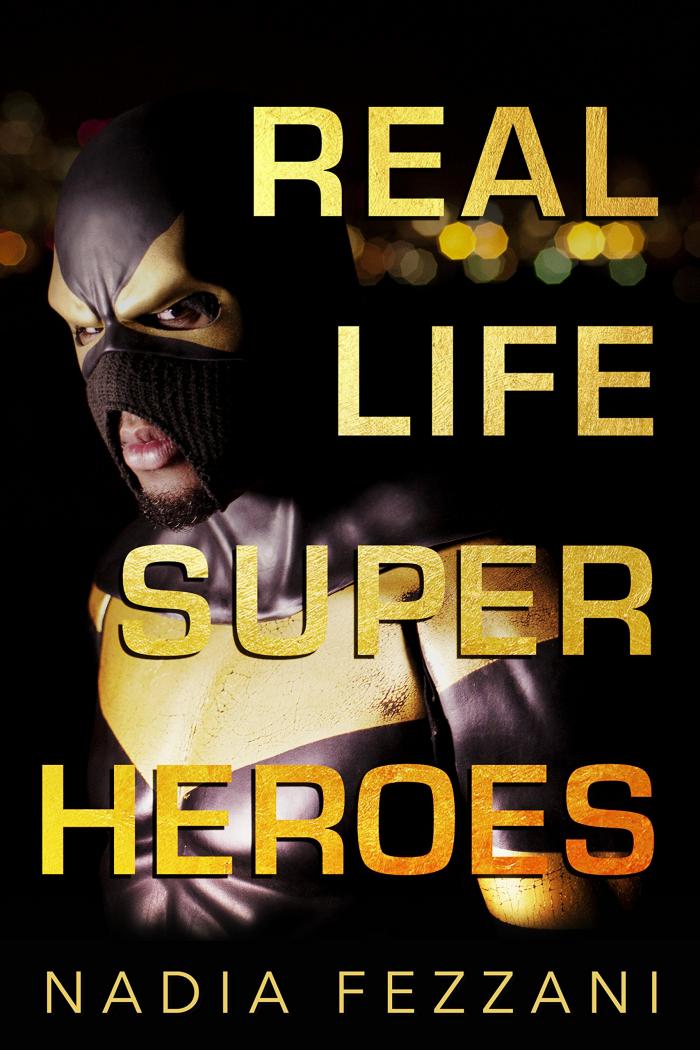Nadia Fezzani and the Rise of the (Real Life) Super Hero
FTC Statement: Reviewers are frequently provided by the publisher/production company with a copy of the material being reviewed.The opinions published are solely those of the respective reviewers and may not reflect the opinions of CriticalBlast.com or its management.
As an Amazon Associate, we earn from qualifying purchases. (This is a legal requirement, as apparently some sites advertise for Amazon for free. Yes, that's sarcasm.)

Not a dream! Not a hoax! Not an imaginary story! The superheroes that have populated the four-color tales of the comic book pages have made the transition into reality. They go by names like Thanatos or Mr. Xtreme or Phoenix Jones. They have costumes and missions that drive them. And you may even have one operating in your city!
Author Nadia Fezzani has spent time with several of these crimefighters across the United States and Canada, and has chronicled her experiences in REAL LIFE SUPER HEROES from Dundurn. As anyone who frequents CriticalBlast knows, we have an affinity for the super hero as well as for those who appear publicly in costumes. So we were eager to speak with Ms. Fezzani and dig up a few more answers about the addition of these characters to real life society.
Is the Real Life Super Hero (RLSH) movement a fad, an extension of cosplay, or something larger--a step for societal evolution?
It’s hard to say if this is a fad. Real Life Super Heroes share the same ideas as cosplay, but the community really is, in many ways, a form of society imitating art.
It is a societal evolution of a certain type of person and if nothing else, an admirable social phenomenon.
For as many years as we've been publishing comic books about superheroes, was it only a matter of time before they became real; just like many other older forms of science fiction that have now become part of everyday life?
RSLH is, in many ways, merely a simulation of those who do not exist but who are hoped for. Heroes given special powers to defend the powerless is a strong theme in our mythology since at least the earliest written history. RLSH sees themselves not only as hope for themselves but also stand as a symbol or ideal for others to see.
Your research was made possible in large part due to the fact that the RLSH community publicizes itself via Facebook and other social media platforms. In your journeys, did you ever hear of urban legends of any RLSHs who shunned the spotlight and the teamups, and could not be found?
Legends of mysterious heroes and a few scoundrels were heard from time to time. However, these stories often called back to a time before social media. Real Life Super Heroes are in their nature about being seen. This can be easily observed by their visually-striking costumes. Being a symbol is as much as what their actions are. There are some people who have operated for the good of others and are not very active on social media.
As a follow-up to that question, how far are we (if, indeed, we aren't already unknowingly there) from someone with actual training and real resources going all Bruce Wayne / Tony Stark? Someone who takes it from an altruistic hobby to a superhero mission?
There may be someone like Iron Man or Batman waiting to be discovered. It is plausible that someone under specific circumstances may use their funds and/or discipline to make a difference in the world. However someone with the money and influence as Stark or Wayne would be able to affect the world in a much more effective way with charitable or political influences.
What motivated you to seek out and write about the RLSH community?
For years I had studied and interview Serial Killers researching my first book, Through the Eyes of Serial Killers: Interviews with Seven Murders. While it was informative and led to a few positive outcomes, it was also very dark. I wanted an opportunity to focus on an upbeat and noteworthy aspect of our culture. I had seen Seattle's Phoenix Jones on the news and was instantly hooked.
Do we need RLSHs?
That is a good question. I haven’t seen anyone sad about being helped while the police weren’t around.
In the closing of your book, you mention that a commonality among the RLSH community is psychological issues -- not for wearing the mask, but from things in their past that shaped them. Again, this seems to have been predicted in comics with characters like Bruce Wayne, who acts out of childhood trauma, or Superman who acts out of a desire to belong to a group while being an ultimate outsider.
The Batman/Bruce Wayne story copies from real life in that regard. Many people have faced hardship in their lives. These events in many ways help shape and steer people in their identity and action. Some for better, and some for worse. The psychological aspect is shared by both Serial Killers and some RLSH. This is not to say Real Life Super Heroes are dangerous, but many of both groups have had hardship and pain and have had to choose how to face it.
You've had the training. You've been given a mask. You have actual patrol experience in dangerous situations. Have you finally settled on a RLSH identity?
Yes - I'm Nikki Vine, vigilante! I punish evildoers and set-right what is wrong. Just kidding, of course. I admire the thought of those who defend others, but I feel I should stick with my strengths and keep telling stories instead starring in them.


